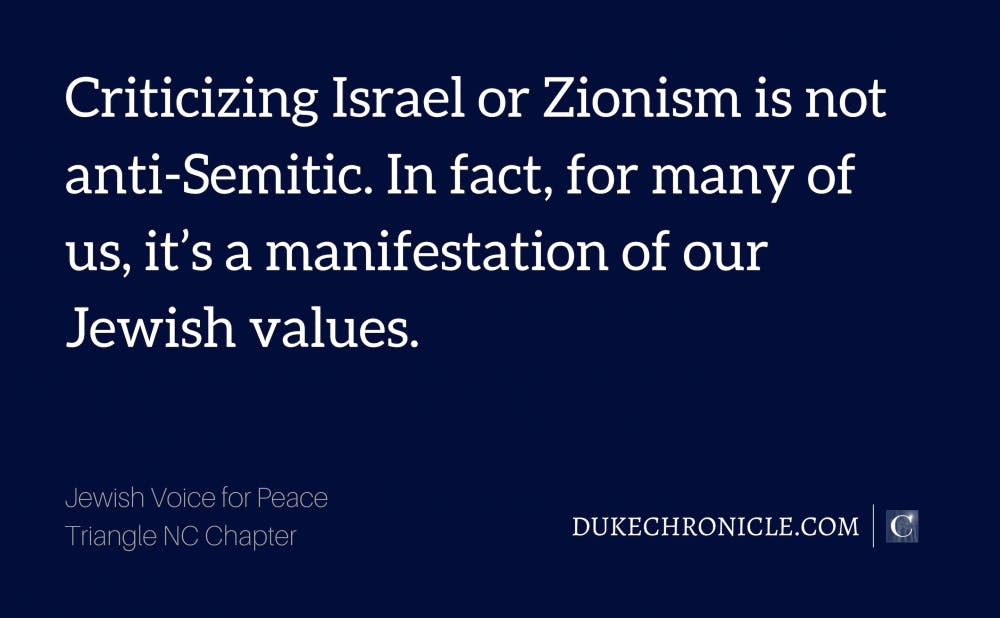We are Jews—members of synagogues, Jewish Life at Duke attendees and secular folks alike—and many of us are members of the Duke community. We are writing to honor and support the Editorial Board of The Chronicle. We admire the Chronicle Editorial Board’s principled stance in support of Representative Ilhan Omar and their brilliant call for international solidarity against state violence. As Jews, we join with others committed to justice in our support of Palestinian liberation. And we are horrified at the Islamophobic and anti-Black tenor of the accusations against Representative Omar.
We want to work to create a Duke community that is safe and affirming for Black students and workers, Jewish students and workers, immigrant and international students and workers, Palestinian students and workers, and queer students and workers. To do that, we have to understand the roots of anti-Semitism in white supremacy, and commit to dismantling racism alongside Islamophobia and anti-Semitism.
Many of our family and friends in the Jewish community would like to see any criticism of Israel as a criticism of all Jewish people, but this is simply not true, and the Chronicle’s measured support for Representative Omar is not anti-Semitic.
In the past few years, we have heard a proliferation of anti-Semitic conspiracy theories from Donald Trump and his supporters—including fantasies that white Jews secretly control everything from global finance and immigration policy to Black Lives Matter and other people-of-color-led social movements. And we have seen violent manifestations of anti-Semitism from Pittsburgh to Charlottesville, and closer to home, a bright red swastika painted over the Tree of Life memorial at East Campus.
Yet people across the political spectrum must continue to learn about anti-Semitism. Jews for Racial and Economic Justice (JFREJ), a multiracial organization based in New York City, offers a resource entitled Understanding Antisemitism. According to JFREJ, “Antisemitism is the form of ideological oppression that targets Jews. In Europe and the United States it has functioned to protect the prevailing economic system and the almost exclusively Christian ruling class by diverting blame for hardship onto Jews.”
Anti-Semitism bolsters white supremacy because it masks the fact that those in power are actually responsible for economic crises, and delegitimizes social movements led by people of color and working people. We remain committed to organizing against anti-Semitism as part of all of our social movements.
Criticizing Israel or Zionism is not anti-Semitic. In fact, for many of us, it’s a manifestation of our Jewish values. Jewish Voice for Peace’s recent statement on Zionism explains, “While it had many strains historically, the Zionism that took hold and stands today is a settler-colonial movement, establishing an apartheid state where Jews have more rights than others.” For us, rejecting Zionism means choosing solidarity and collective liberation. For us, rejecting Zionism means opposing ethno-nationalism, and opposing a system of government that grants people different rights based on race or religion.
As Representative Omar pointed out, it’s simply a fact that AIPAC—along with a coalition of other pro-Israel U.S.-based organizations—works to organize continued Congressional support for $38 billion of U.S. military aid to Israel. That’s $38 billion that should be used for housing, education and healthcare here in the U.S., not on violence abroad. Nearly all of us have been recruited to attend at least one all-expenses-paid trip to Israel designed to generate sympathy and support for the country. Law students, leaders of College Republicans and Democrats, young Jews, police chiefs, ICE agents and elected officials are only some of the groups offered such trips.
It’s also vital to note that the largest pro-Israel advocacy and lobbying organization in this country is actually Christians United for Israel (CUFI). CUFI is bolstered by evangelical Christians who believe particular end-of-times prophecies which see Jewish possession of the Holy Land as a prerequisite for the Rapture (which, it turns out, is not a favorable event for the Jews).
Although there have long been Americans speaking out against Israeli apartheid, we have seen that Black people are the ones who face the harshest political consequences for supporting Palestinian human rights. Nonetheless, there is a strong tradition of Black-Palestinian solidarity in the South that continues today, supported by Black Muslims, Black Christians and Black Jews alike. Here in Durham, we were so proud of the Demilitarize! Durham2Palestine coalition, a coalition of organizations including our chapter, as well as BYP100 Durham Chapter and Duke Students for Justice in Palestine, which made Durham the first city to denounce and halt its police training with the Israeli military.
We see the Chronicle’s Editorial Board as part of this proud legacy of internationalism in the South. We honor their call to take part in “rigorous and unyielding international solidarity, ‘from Ferguson to Gaza.’” And we support Ilhan Omar.
This guest column was submitted by Sandra Korn, Lara Haft and Beth Bruch on behalf of the Triangle NC Chapter of Jewish Voice for Peace.
Get The Chronicle straight to your inbox
Signup for our weekly newsletter. Cancel at any time.

